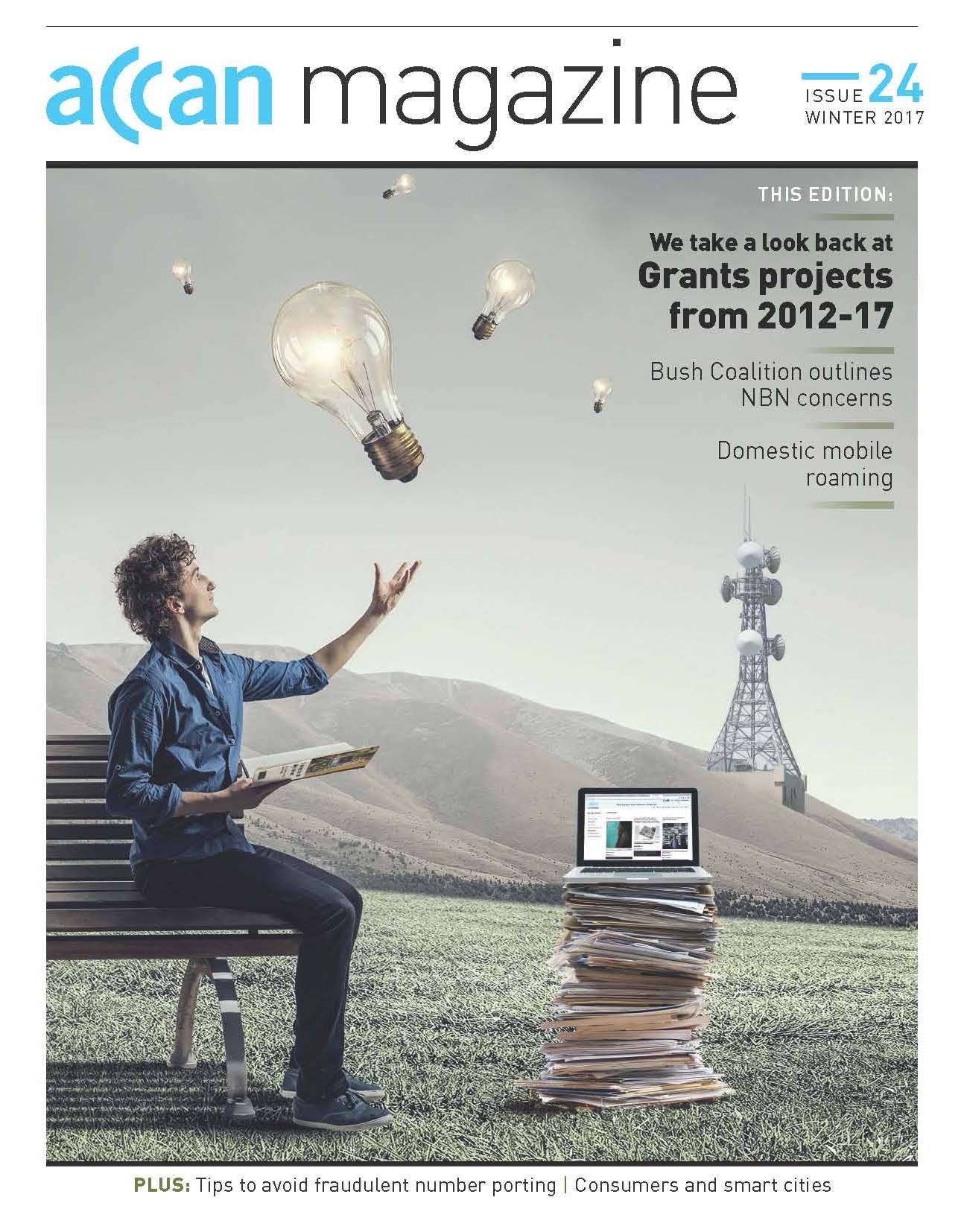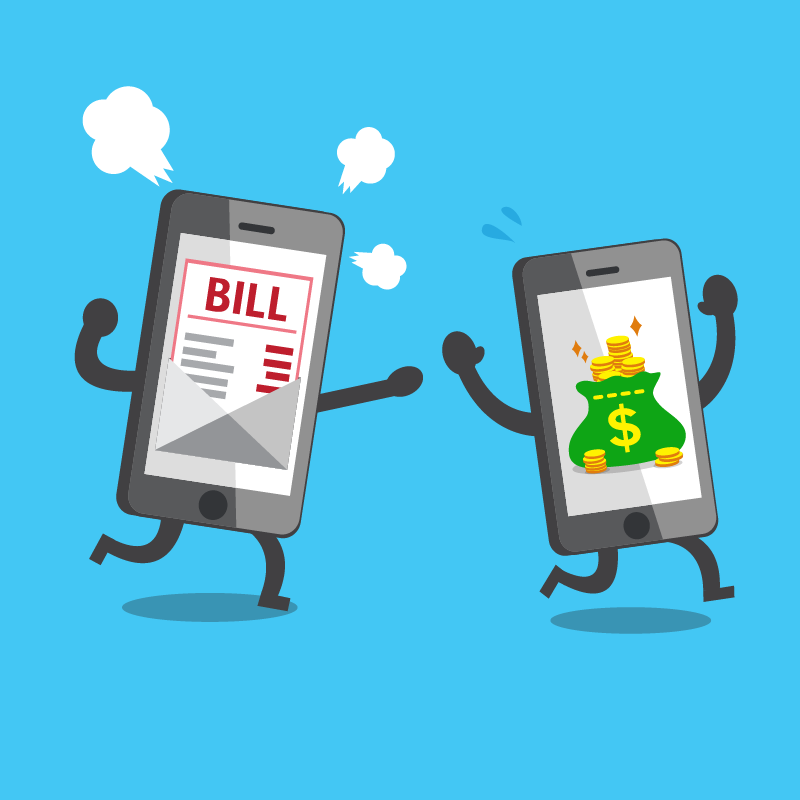- Details
ACCAN does not believe that the current framework governing the delivery of broadband services is in the interest of consumers. Too often consumers have no transparency or assurance over their service, get passed between retailer and wholesaler and could potentially be left without access to any network. ACCAN strongly supports the Statutory Infrastructure Provider legislation. We encourage the introduction of the legislation as quickly as possible so the powers within the legislation can be used to protect consumers and their services.
- Details
ACCAN has responded to the ACCC’s draft decision not to regulate mobile roaming across the three mobile networks (Telstra, Optus and Vodafone).
ACCAN supports the ACCC’s approach. The majority of our members in regional, rural and remote areas do not consider regulating roaming will stimulate more coverage and improved services, but at the same time they would welcome greater competition and choice of provider. Our submission identifies other ways the ACCC could support more competition.
- Details
In June we were very excited to sign a new funding contract with the Department of Communications and the Arts. The new contract ensures that ACCAN will continue to represent consumers in the telecommunications industry for the next five years.
When the contract was signed, ACCAN CEO, Teresa Corbin said: “The recent ACCAN review highlighted the strong support for the work ACCAN does and many stakeholders reinforced the need for a united consumer voice in the telecommunications industry.
“A big thank you must go to ACCAN’s supporters including members, volunteers and industry representatives for their ongoing commitment to ensuring we remain a relevant and effective organisation.”
Read more: Five years of ACCAN consumer wins
Write comment (0 Comments)- Details
 In the past five years, a total of $1,256,055.86 has been awarded to universities, research organisations, community groups and not for profit organisations to help consumers navigate the telecommunications and technology landscape.
In the past five years, a total of $1,256,055.86 has been awarded to universities, research organisations, community groups and not for profit organisations to help consumers navigate the telecommunications and technology landscape.
The ACCAN Grants Scheme has funded 31 different projects since 2012, examining emerging technologies like 3D printing, through to more serious consumer issues, such as technology facilitated stalking and abuse.
Read more: In the field – ACCAN Grants Scheme 2012-17
Write comment (0 Comments)- Details
The summary below outlines ACCAN's activities from 1 March – 31 May 2017.
- Details

Download: ![]() ACCAN Magazine Issue 24 Winter 20173.71 MB (Note: reading order not accessible)
ACCAN Magazine Issue 24 Winter 20173.71 MB (Note: reading order not accessible)
Download accessible version: ![]() ACCAN Magazine Issue 24 Winter 2017 - accessible version39.76 KB
ACCAN Magazine Issue 24 Winter 2017 - accessible version39.76 KB
- Details
The Telecommunications Industry Ombudsman (TIO) is required by section 133A of the Telecommunications (Consumer Protection and Services Standards) Act 1999 to undergo an independent review. The review is being conducted by private consultancy Cameron.Ralph.Khoury and is to be completed by 17 August 2017. ACCAN submitted to the review after consulting with its members about their experiences with, and opinions of the TIO.
Read more: Independent Review of the Telecommunications Industry Ombudsman
- Details
A new survey, commissioned by the Australian Communications Consumer Action Network (ACCAN), has revealed that 12 per cent of respondents experienced unexpected third party charges on their mobile phone bills in the last six months.
“Applied to the mobile customer base of Telstra, Optus and Vodafone, this 12 per cent equates to almost 1.9m people who could have received unexpected charges on their mobile bills. We estimate that collectively, consumers may have been charged as much as $20m unexpectedly in the last six months*,”said ACCAN Director of Policy, Una Lawrence. “ACCAN is calling for better protections to be put in place so that consumers don’t get caught out with unexpected charges on their mobile bills.”
The ACCAN survey found people are buying apps, games, entering competitions, getting news updates and voting on TV shows and charging it to their mobile accounts. While this may suit some consumers, just under 50 per cent of respondents were unaware their phone could be used this way. Over a third who had incurred unexpected charges reported that they weren’t informed, didn’t consent to or confirm the charge, or understand how or how much they would be charged.
Read more: Unexpected mobile charges may be costing consumers millions
- Details
 Results from a survey commissioned by ACCAN show that 12 per cent of respondents had experienced unexpected third party charges on their mobile phone bills in the last six months. Consumers can opt out of these services by texting ‘STOP’ to SMS notifications they receive from third party providers. However, ACCAN’s survey found that over three quarters (77 per cent) of people who replied ‘STOP’ still had the charge added to their bill. Over a third (36 per cent) of unexpected charges were for $10 or more.
Results from a survey commissioned by ACCAN show that 12 per cent of respondents had experienced unexpected third party charges on their mobile phone bills in the last six months. Consumers can opt out of these services by texting ‘STOP’ to SMS notifications they receive from third party providers. However, ACCAN’s survey found that over three quarters (77 per cent) of people who replied ‘STOP’ still had the charge added to their bill. Over a third (36 per cent) of unexpected charges were for $10 or more.
Read more: Third Party Charges - consumer experiences and expectations
- Details
 Have you noticed how more and more everyday items are now connected to the internet?
Have you noticed how more and more everyday items are now connected to the internet?
While we used to have ordinary watches that told us the time and the date, we now have smartwatches that track our fitness, alert us about emails and more.
Read more: Explore the connected world at ACCANect 2017
Write comment (0 Comments)- Details
The Government’s commitment to providing the National Relay Service (NRS) into the future is welcomed, however, ACCAN is concerned about the lack of provision to increase funding even though new relay options were introduced over the last three years.
“The NRS has been a critical communications channel for Australians who are Deaf, hearing-impaired or speech-impaired for more than two decades and it continues to be an essential service for many consumers,” said ACCAN Disability Policy Advisor, Wayne Hawkins.
“The introduction of video relay, SMS relay, two-way internet relay, the NRS app and captioned telephony has made Australia’s National Relay Service a worlds-best service for people who are Deaf, hearing-impaired or speech-impaired and it should be applauded.
Read more: ACCAN voices concerns about proposed changes to the NRS
- Details
ACCAN recently submitted to the Communications Alliance on its consultation paper, Industry Managed Numbering Arrangements. Communications Alliance is proposing to take over all responsibilities for the management of telecommunications numbering, which is currently undertaken by the ACMA, Communications Alliance, and Industry Number Management Systems Ltd.
Numbering is important as telephone numbers let consumers know what type of service is being called (i.e. a mobile, national, international, toll or free number) and how much a call is likely to cost. This has important accessibility and affordability implications.
